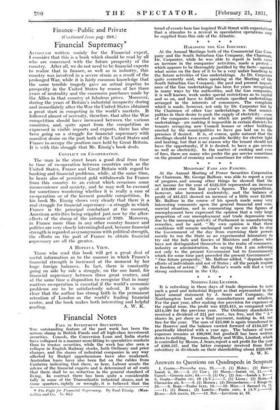Finance—Public and Private (Continued from page 288.) . Financial Supremacy *
ALTHOUGH written mainly for the - Financial expert, I consider that this is a book which should be read by all who are concerned with the future prosperity of the country. After all, we do not need to be financial experts to realize that in finance, as well as in industry, this country was involved in a severe strain as a result of the prolonged War, while it is fairly common knowledge that the same terrible tragedy gave an actual impetus to prosperity in the United States by reason of her three years of neutrality and the enormous purchases made by the Allies in that country at fabulous prices. Moreover, during the years of Britain's industrial incapacity during and immediately after the War the United States obtained a great start in competing in the world's markets. It followed almost of necessity, therefore, that after the War competition should have increased between the various countries, and, quite apart from the competition as expressed in visible imports and exports, there has also been going on a struggle for financial supremacy with manifest desire on the part both 'of the United States and France to occupy the position once held by Great Britain. It is with this struggle that Mr. Einzig's book deals.
CONFLICT OR CO-OPERATION.
The man in the street hears a good deal from time to time of co-operation between countries such as the United States, France and Great Britain with regard to banking and financial problems, while, at the same time, he hears also of persistent gold withdrawals for France from this country to an extent which occasions some inconvenience and anxiety, and he may well be excused for sometimes wondering whether it is really a case of co-operation or of the keenest possible competition. In his book Mr. Einzig shows very clearly that there is a real struggle for financial supremacy—a struggle in which France is the principal combatant at the moment, American activities being crippled just.now by the after- effects of the slump of the autumn of 1929. Moreover, in France more than in any other country finance and politics are very closely intermingled and, because financial strength is regarded as synonymous with political strength, the efforts on the part of France to obtain financial supremacy are all the greater.
A HOPEFUL VIEW.
Those who read this book will get a great deal of useful information as to the manner in which France's financial strength is increased at the moment by her huge foreign balances. In fact, there is constantly going on side by side a struggle, on the one hand, for financial supremacy between three great centres, and at the same time a disposition to recognize that in many matters co-operation is essential if the world's economic problems are to be satisfactorily solved. It is quite clear that the author has strong faith in the permanent retention of London as the world's leading financial centre, and the book makes both interesting and helpful











































 Previous page
Previous page